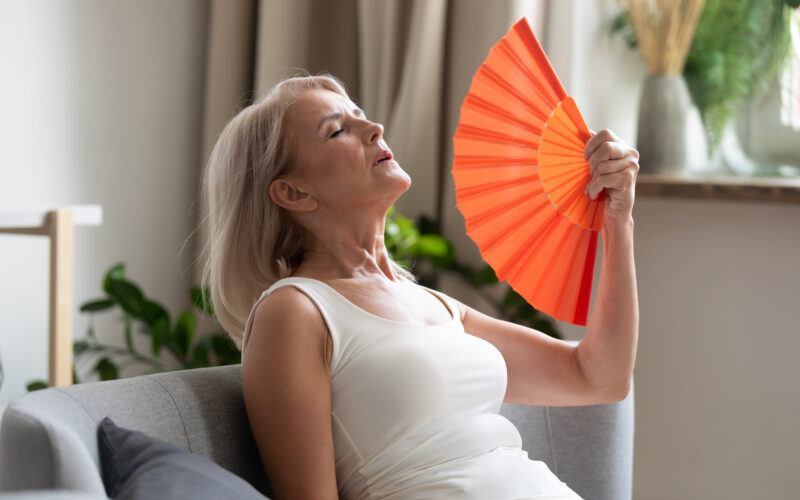In People magazine’s May 2024 “Beautiful” issue, supermodel Tyra Banks reflected on… menopause symptoms! That’s right. The 50-year-old supermodel formerly best-known for hosting America’s Next Top Model is now dishing on hot flashes and how to respond to the female body’s natural aging process.
Banks commented, “Women that are approaching 50, I’m not sure if you started hot flashing yet, but it may come and it is not the end of the world.” She urged, “Use that time that you wake up in the middle of the night to just take care of some things because it will wake you up. Read that book, do that crossword puzzle. And most importantly, keep things in perspective.”
Banks acknowledged that, in some ways, the symptoms of female aging are more accepted now than in generations past. ”Don’t trip about it. Don’t be ashamed about it because we [are] all going to go through it and now we can do it together and talk about it, which is really cool and much better than what our parents had to do: Just hold it in and pretend like I’m not hot flashing. Isn’t that the sun? No, child. That’s you and that’s okay, boo.”
Are menopause symptoms more frequent than they used to be?
Menopause happens to all women as a natural part of aging, and is signaled by the complete cessation of periods for twelve consecutive months. Unfortunately, as Banks alluded, it can come with unpleasant symptoms like hot flashes, night sweats, trouble sleeping, and mood swings. These symptoms can start 10 years prior to menopause. We know women are more likely to experience hot flashes if they have higher BMI, smoke, take certain medications, or report high stress and anxiety. But what we didn’t know (and what has been the subject of recent research) is whether women are more or less likely to experience hot flashes now than they were 50 or 100 years ago.
To better understand whether hot flashes are more common now than they were for our foremothers, Swedish researchers studied 4 generations of women when they turned 50. Beginning in 1968 and ending in 2017, they interviewed over 1,300 women born in 1918, 1930, 1954, and 1966, and asked them about how often they experienced hot flashes [1].
Participants were asked:
- Do you sometimes…get “hot flashes?”
- How often do they occur?
- Have you experienced any periods of stress?
Women born in 1954 or 1966 were more likely than women born in 1918 or 1930 to experience hot flashes every day
Based on their answers to the first question, the women who answered “yes” to sometimes getting hot flashes were divided into two groups: those who had hot flashes daily, and those who had hot flashes less frequently. Then, the researchers compared whether the women with daily hot flashes were born earlier (1918 or 1930) or later (1954 or 1966).
Unsurprisingly, women born earlier and women born later were about equally likely to experience hot flashes. Surprisingly, women who were born in 1954 or 1966 were almost twice as likely to experience daily hot flashes compared to women born in 1918 or 1930. What’s more, in both women born later and women born earlier, those who were taking hormone replacement therapy (HRT) were more likely to experience hot flashes than those who were not. (On the other hand, women who experience intense hot flashes may be more likely to ask for HRT for symptom relief and HRT is widely understood to decrease hot flashes [2].) And while fewer women born in 1954 or 1966 smoked compared to those born in 1918 or 1930, those who did smoke were much more likely to experience hot flashes than their nonsmoking peers.
Why are more women experiencing daily hot flashes now?
So, what’s changed? Certainly, there are some obvious differences between women born in the early and late 1900s. Fewer women smoke now, but the mental stress of modern life and the way we eat now are very much changed. Since stress, for example, has a known impact on hot flash frequency, researchers needed to account for this and other potential confounding variables. Otherwise, they wouldn’t be making an apples-to-apples comparison and might assume that menopause itself is different now, when it might be that modern women are more stressed than our foremothers.
However, even when the Swedish researchers accounted for confounding factors like stress, the results were largely the same–women born later reported daily hot flashes almost 2 times more than women born earlier.
Are endocrine-disrupting chemicals part of the problem?
This finding surprised the researchers. Lead investigator Kerstin Rödström told MedPage Today, “We did not anticipate this result, as women today exercise more, smoke less, and have access to healthier food. One speculation is that social and environmental factors, such as stress and endocrine-disruptive chemical pollutants, can affect vasomotor symptoms [like hot flashes and night sweats].”
Ultimately, Rödström and her colleagues speculated that hot flash frequency might be related to higher stress levels among women born after 1954. They also cited increased exposure to certain hormone-disrupting, plasticizing chemicals like phthalates, chemical compounds that are used to make plastics more flexible and durable. Rödström et al also cited other research showing that women experiencing daily or weekly hot flashes had higher concentrations of phthalates in their urine [3,4].
The bottom line
It may be true that women today are experiencing more hot flashes than their grandmothers and great-grandmothers before them. Whether you feel the fire daily or less often, know that you have options, and they don’t all include taking hormones. Achieving metabolic and reproductive health prior to menopause may make the transition much easier. Check out our perimenopause resources–including why now is a great time to start charting your cycles even if you never have before–here, here, and here. And for more information on avoiding endocrine disruptors and balancing hormones, visit our topic page on Hormone Imbalance.
References:
[1] Rödström, Kerstin MD, PhD; Weman, Lilian BA; Sundh, Valter MS; Björkelund, Cecilia MD, PhD. Perception of higher frequency of daily hot flashes in 50-year-old women today: a study of trends over time during 48 years in the Population Study of Women in Gothenburg, Sweden. Menopause 29(10):p 1124-1129, October 2022. DOI: 10.1097/GME.0000000000002033 [2] MacLennan A, Lester S, Moore V. Oral estrogen replacement therapy versus placebo for hot flushes: a systematic review. Climacteric. 2001 Mar;4(1):58-74. PMID: 11379379. [3] Ziv-Gal A, Gallicchio L, Chiang C, Ther SN, Miller SR, Zacur HA, Dills RL, Flaws JA. Phthalate metabolite levels and menopausal hot flashes in midlife women. Reprod Toxicol. 2016 Apr;60:76-81. doi: 10.1016/j.reprotox.2016.02.001. Epub 2016 Feb 8. PMID: 26867866 [4] Warner GR, Pacyga DC, Strakovsky RS, Smith R, James-Todd T, Williams PL, Hauser R, Meling DD, Li Z, Flaws JA. Urinary phthalate metabolite concentrations and hot flashes in women from an urban convenience sample of midlife women. Environ Res. 2021 Jun;197:110891. doi: 10.1016/j.envres.2021.110891. Epub 2021 Mar 17. PMID: 33722529







Im 62 years and I have never experienced a hot flash. I have never used hormonal birth control. HBC was approved by the FDA in 1962. After spending many hours with a research doctor she said the HBC can cause so much havoc to a woman’s body/cycle especial at a young age changes everything. Past generations women didnt have access to HBC and didnt all these disrupters like woman have today. I only have one friend who never used HBC either and shes never experienced a hot flash either. It would interesting if they would conduct a study with non users and see what the results are. The reason I spent so much time with these doctors because my 23 yr old daughter died from a blood clot using a HBC. No she did not have a clotting issue! Watch “ Business if Birth Control,” read “Sweeting the Pill and look at “Birthcontrolsafety.org”